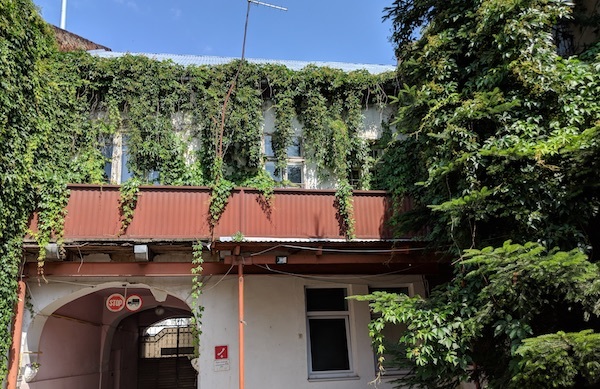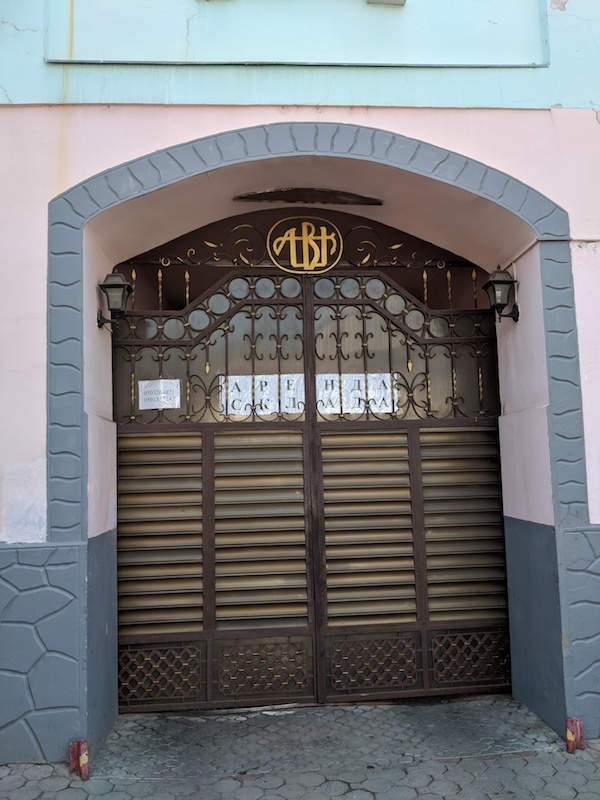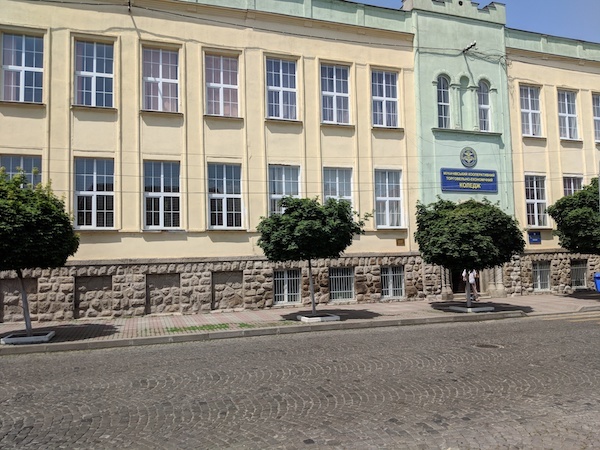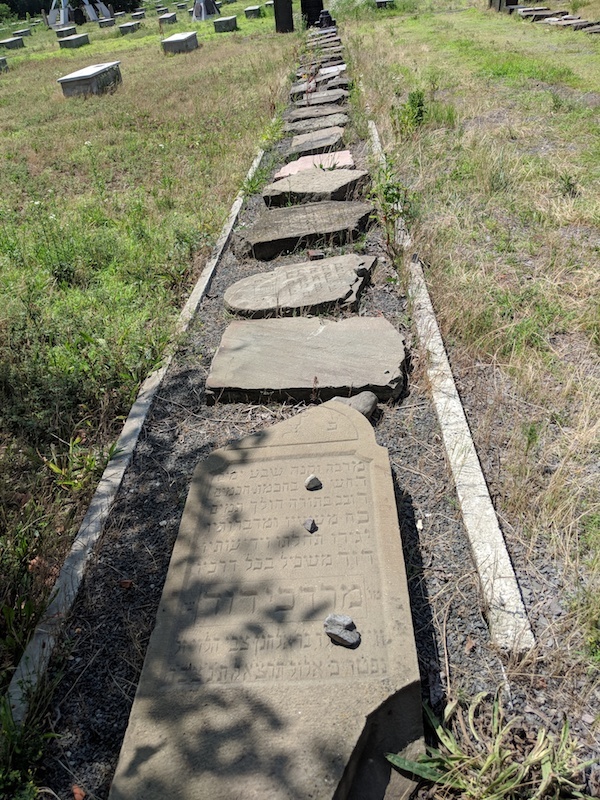Jun. 26th, 2018 07:08 pm
Back in Munkacs
The next day the driver brings Tilda and Yuri over to Munkacs, so that she can show us where my mother and her family lived. When we get to the address we find that not only are they already there, the driver has already called out the security guard watching over the property and paid him to let us into the courtyard behind the house. The house seems too small to contain two parents and six children, and too small for all the stories my mother told about her childhood.

In the courtyard we also see the building that housed my grandfather’s paper factory. After the war it had been used as a candy factory, and now it’s empty, which is why it needs a security guard. Tilda had worked in the paper factory and so had her husband, Ernest. There’s an interview with Ernest online in which he says, about the early days of life under Communism, “We believed everything the Communist Party said. We belonged to the proletariat when we were young working for the owner of a factory. He exploited us.” None of my grandfather’s children had ever hinted at anything like that, though I did know that there had been a strike at the factory and that my Commie aunt had joined in. It’s a whole new perspective to think of my grandfather as a capitalist oppressor, although, unfortunately, it doesn’t conflict with anything I know about him. When you go looking for your ancestors you have to accept what you find, but I take solace in the fact that at least one of my aunts was a trouble-maker.

The factory is on the left
Then we see an open door leading to the cellar. We’d heard a lot about this cellar when we were kids. When the family was sent to the ghetto my grandfather buried some jewelry within one of the walls, which are about a foot thick. My mother’s brother returned after the war and managed to dig some of it up, but he was interrupted and had to leave. A few decades later some men doing construction work found some more, but then, after they’d gone drinking to celebrate, they came to blows over who should get what. They were arrested and the jewelry confiscated, and everything was turned over to the state.
The security guard tells us there are rats in the cellar, and there’s a huge kind of spider I’d never seen before hanging by the door. Despite this my brother and I venture down the stairs, at least one of us feeling like Indiana Jones, and look around with a phone flashlight. We see the thick walls and some junk left over from construction work, then hurry back outside. There might be more treasures there, but if there are someone else can dig them up.
The candy company that had owned the factory, A.B.K., has a store next door, and we buy a lot of their chocolate bars and wafers. It’s very good.

We also see Tilda’s old house, the Gymnasium (which seems to correspond to a high school in the U.S.),

and the old Jewish cemetery. At the cemetery the driver knows not only who to call to be let in but, while we’re waiting, tells us the current gossip about the guy. Once inside we see that it’s been completely destroyed, with no indication of who was buried where. Only a few broken tombstones are left.

On this trip a lot of the poverty of the region comes home for me. There are slowly disintegrating buildings made out of wood or tin (possibly chicken coops or outhouses, but possibly places where people lived), and houses covered in peeling concrete, revealing the brickwork underneath, and many buildings are simply empty. We’d marveled at how cheap everything is, but the reason for that, unfortunately, is that a lot of people are living below the poverty line.
Things my mother would be amazed to find in Munkacs: a mall, a bowling alley, sushi, solar panels, a 24-hour mini-market.

In the courtyard we also see the building that housed my grandfather’s paper factory. After the war it had been used as a candy factory, and now it’s empty, which is why it needs a security guard. Tilda had worked in the paper factory and so had her husband, Ernest. There’s an interview with Ernest online in which he says, about the early days of life under Communism, “We believed everything the Communist Party said. We belonged to the proletariat when we were young working for the owner of a factory. He exploited us.” None of my grandfather’s children had ever hinted at anything like that, though I did know that there had been a strike at the factory and that my Commie aunt had joined in. It’s a whole new perspective to think of my grandfather as a capitalist oppressor, although, unfortunately, it doesn’t conflict with anything I know about him. When you go looking for your ancestors you have to accept what you find, but I take solace in the fact that at least one of my aunts was a trouble-maker.

The factory is on the left
Then we see an open door leading to the cellar. We’d heard a lot about this cellar when we were kids. When the family was sent to the ghetto my grandfather buried some jewelry within one of the walls, which are about a foot thick. My mother’s brother returned after the war and managed to dig some of it up, but he was interrupted and had to leave. A few decades later some men doing construction work found some more, but then, after they’d gone drinking to celebrate, they came to blows over who should get what. They were arrested and the jewelry confiscated, and everything was turned over to the state.
The security guard tells us there are rats in the cellar, and there’s a huge kind of spider I’d never seen before hanging by the door. Despite this my brother and I venture down the stairs, at least one of us feeling like Indiana Jones, and look around with a phone flashlight. We see the thick walls and some junk left over from construction work, then hurry back outside. There might be more treasures there, but if there are someone else can dig them up.
The candy company that had owned the factory, A.B.K., has a store next door, and we buy a lot of their chocolate bars and wafers. It’s very good.

We also see Tilda’s old house, the Gymnasium (which seems to correspond to a high school in the U.S.),

and the old Jewish cemetery. At the cemetery the driver knows not only who to call to be let in but, while we’re waiting, tells us the current gossip about the guy. Once inside we see that it’s been completely destroyed, with no indication of who was buried where. Only a few broken tombstones are left.

On this trip a lot of the poverty of the region comes home for me. There are slowly disintegrating buildings made out of wood or tin (possibly chicken coops or outhouses, but possibly places where people lived), and houses covered in peeling concrete, revealing the brickwork underneath, and many buildings are simply empty. We’d marveled at how cheap everything is, but the reason for that, unfortunately, is that a lot of people are living below the poverty line.
Things my mother would be amazed to find in Munkacs: a mall, a bowling alley, sushi, solar panels, a 24-hour mini-market.
Tags: